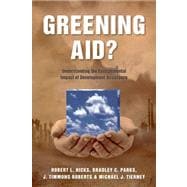
Note: Supplemental materials are not guaranteed with Rental or Used book purchases.
Purchase Benefits
What is included with this book?
| List of Figures | p. xii |
| List of Tables | p. xiv |
| List of Acronyms | p. xvi |
| From Rio to Gleneagles: Has Aid Been Greened? | p. 1 |
| Billions for the Earth? Patterns of Environmental Assistance | p. 20 |
| Who Receives Environmental Aid? Patterns of Allocation and Case Studies of Five Major Recipients | p. 54 |
| To Areas of Need, Opportunity, or Strategic Interest? Explaining Which Countries Receive Environmental Aid and Why | p. 91 |
| Which Donors Are the Greenest? Trends in Bilateral Aid and Key Donor Profiles | p. 123 |
| The Political Market for Environmental Aid: Why Some Donors Are Greener Than Others | p. 159 |
| Have the Multilaterals Been Greened? Major Trends and Cases | p. 184 |
| Outsourcing the National Interest? Delegating Environmental Aid to Multilateral Agencies | p. 211 |
| Looking to the Future of Environmental Aid | p. 245 |
| The Project-Level Aid Database | p. 265 |
| Aid Flows to Recipients | p. 273 |
| Technical Details | p. 280 |
| References | p. 293 |
| Index | p. 328 |
| Table of Contents provided by Ingram. All Rights Reserved. |
The New copy of this book will include any supplemental materials advertised. Please check the title of the book to determine if it should include any access cards, study guides, lab manuals, CDs, etc.
The Used, Rental and eBook copies of this book are not guaranteed to include any supplemental materials. Typically, only the book itself is included. This is true even if the title states it includes any access cards, study guides, lab manuals, CDs, etc.